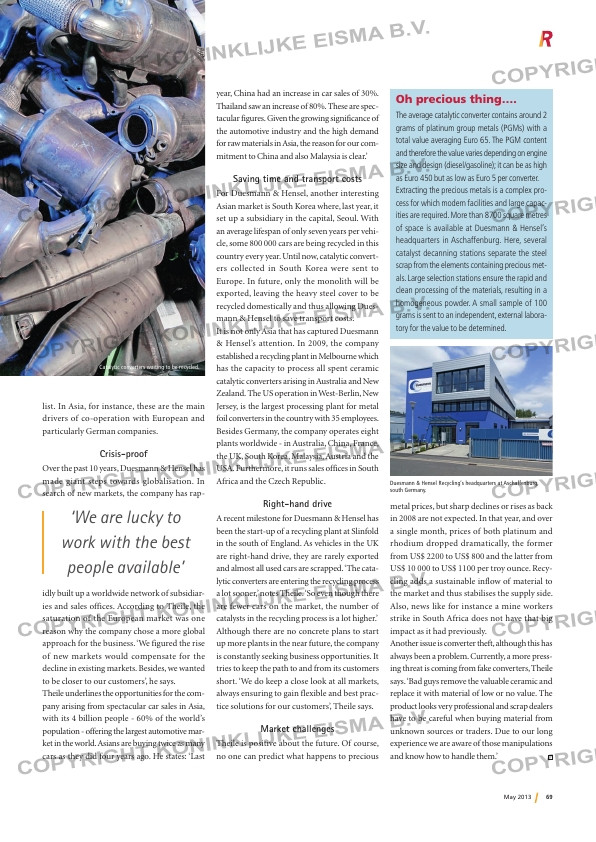Page 69 from: May 2013

69May 2013
list. In Asia, for instance, these are the main
drivers of co-operation with European and
particularly German companies.
Crisis-proof
Over the past 10 years, Duesmann & Hensel has
made giant steps towards globalisation. In
search of new markets, the company has rap-
idly built up a worldwide network of subsidiar-
ies and sales offices. According to Theile, the
saturation of the European market was one
reason why the company chose a more global
approach for the business. ‘We figured the rise
of new markets would compensate for the
decline in existing markets. Besides, we wanted
to be closer to our customers’, he says.
Theile underlines the opportunities for the com-
pany arising from spectacular car sales in Asia,
with its 4 billion people – 60% of the world’s
population – offering the largest automotive mar-
ket in the world. Asians are buying twice as many
cars as they did four years ago. He states: ‘Last
year, China had an increase in car sales of 30%.
Thailand saw an increase of 80%. These are spec-
tacular figures. Given the growing significance of
the automotive industry and the high demand
for raw materials in Asia, the reason for our com-
mitment to China and also Malaysia is clear.’
Saving time and transport costs
For Duesmann & Hensel, another interesting
Asian market is South Korea where, last year, it
set up a subsidiary in the capital, Seoul. With
an average lifespan of only seven years per vehi-
cle, some 800 000 cars are being recycled in this
country every year. Until now, catalytic convert-
ers collected in South Korea were sent to
Europe. In future, only the monolith will be
exported, leaving the heavy steel cover to be
recycled domestically and thus allowing Dues-
mann & Hensel to save transport costs.
It is not only Asia that has captured Duesmann
& Hensel’s attention. In 2009, the company
established a recycling plant in Melbourne which
has the capacity to process all spent ceramic
catalytic converters arising in Australia and New
Zealand. The US operation in West-Berlin, New
Jersey, is the largest processing plant for metal
foil converters in the country with 35 employees.
Besides Germany, the company operates eight
plants worldwide – in Australia, China, France,
the UK, South Korea, Malaysia, Austria and the
USA. Furthermore, it runs sales offices in South
Africa and the Czech Republic.
Right-hand drive
A recent milestone for Duesmann & Hensel has
been the start-up of a recycling plant at Slinfold
in the south of England. As vehicles in the UK
are right-hand drive, they are rarely exported
and almost all used cars are scrapped. ‘The cata-
lytic converters are entering the recycling process
a lot sooner,’ notes Theile. ‘So even though there
are fewer cars on the market, the number of
catalysts in the recycling process is a lot higher.’
Although there are no concrete plans to start
up more plants in the near future, the company
is constantly seeking business opportunities. It
tries to keep the path to and from its customers
short. ‘We do keep a close look at all markets,
always ensuring to gain flexible and best prac-
tice solutions for our customers’, Theile says.
Market challenges
Theile is positive about the future. Of course,
no one can predict what happens to precious
metal prices, but sharp declines or rises as back
in 2008 are not expected. In that year, and over
a single month, prices of both platinum and
rhodium dropped dramatically, the former
from US$ 2200 to US$ 800 and the latter from
US$ 10 000 to US$ 1100 per troy ounce. Recy-
cling adds a sustainable inflow of material to
the market and thus stabilises the supply side.
Also, news like for instance a mine workers
strike in South Africa does not have that big
impact as it had previously.
Another issue is converter theft, although this has
always been a problem. Currently, a more press-
ing threat is coming from fake converters, Theile
says. ‘Bad guys remove the valuable ceramic and
replace it with material of low or no value. The
product looks very professional and scrap dealers
have to be careful when buying material from
unknown sources or traders. Due to our long
experience we are aware of those manipulations
and know how to handle them.’
Oh precious thing….
The average catalytic converter contains around 2
grams of platinum group metals (PGMs) with a
total value averaging Euro 65. The PGM content
and therefore the value varies depending on engine
size and design (diesel/gasoline); it can be as high
as Euro 450 but as low as Euro 5 per converter.
Extracting the precious metals is a complex pro-
cess for which modern facilities and large capac-
ities are required. More than 8700 square metres
of space is available at Duesmann & Hensel’s
headquarters in Aschaffenburg. Here, several
catalyst decanning stations separate the steel
scrap from the elements containing precious met-
als. Large selection stations ensure the rapid and
clean processing of the materials, resulting in a
homogeneous powder. A small sample of 100
grams is sent to an independent, external labora-
tory for the value to be determined.
Duesmann & Hensel Recycling’s headquarters at Aschaffenburg,
south Germany.
Catalytic converters waiting to be recycled.
‘We are lucky to
work with the best
people available’
RI-4_Supplier.indd 69 03-05-13 14:16



